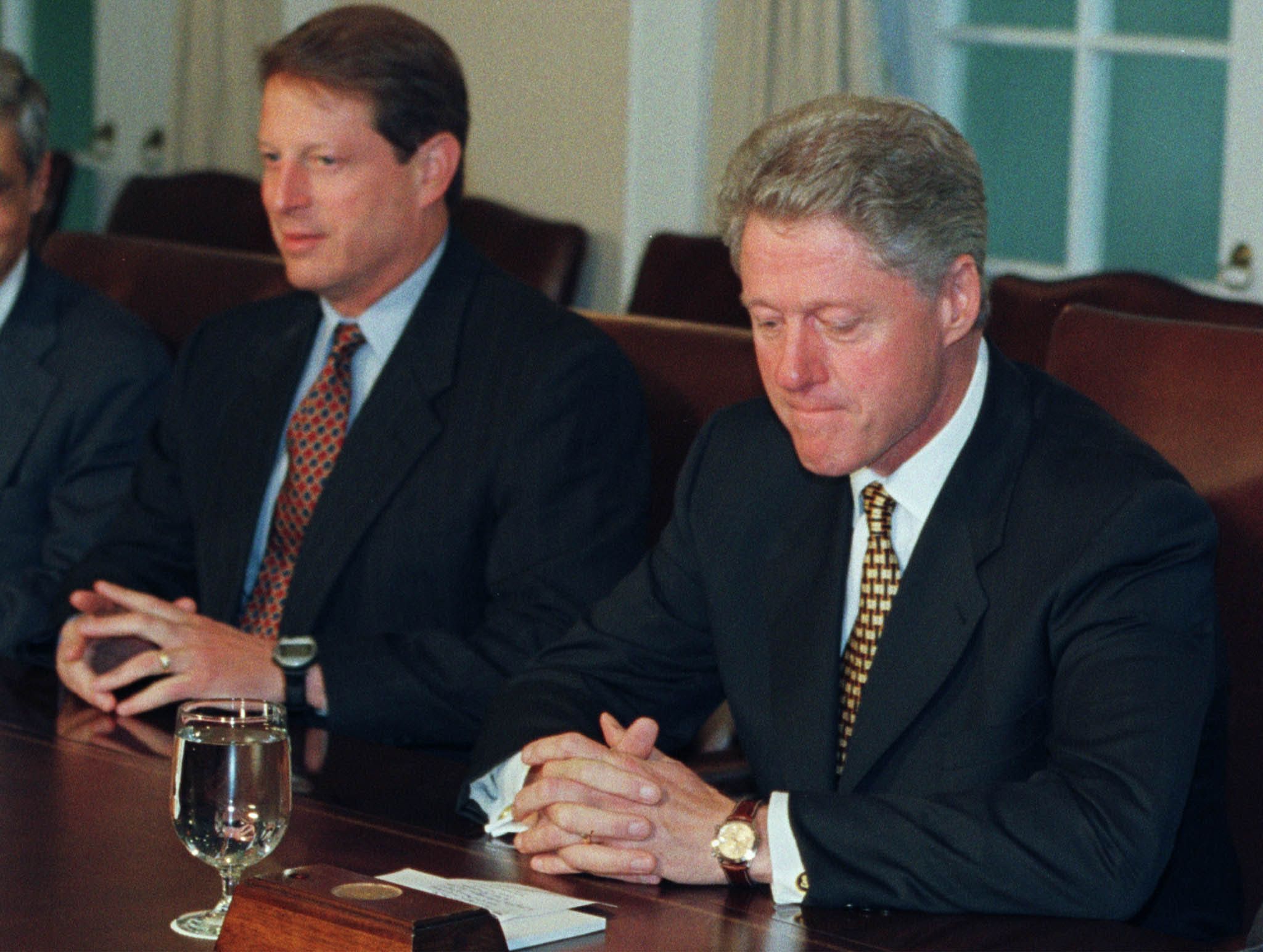
Newsweek published this story by George Stephanopoulos, former senior adviser to President Bill Clinton, under the headline "Why the President Should Tell All," on August 10, 1998. In light of recent news involving President Donald Trump and his potential impeachment, however unlikely, Newsweek is republishing the story.
TWO DAYS AFTER CHRISTMAS 1991, ABOUT 20 OF US ON THE Clinton team met for a strategy session in the basement of the governor's mansion in Little Rock. As we reviewed potential 1992 problems, I mentioned the candidate's draft record. "We're going to need some tighter answers," I said. "It's going to come back." The governor launched into a passionate tirade against the Vietnam War and declared that he'd rather lose the election than say it was right.
That wasn't my point, of course. But raising such a sensitive subject in a big meeting was a rookie's mistake. I had painted Clinton into a corner, and he responded by resenting the question and repressing the answers. Later, a couple of us approached the governor alone. "We're not saying you have to apologize," I explained. "But we need the same information our opponents have." He nodded and approved our plan to investigate his record. But it was too late; our opponents and the press were way ahead of us.
Now President Clinton is on the threshold of grand-jury scrutiny that will make the inquiry into his draft history seem like a pleasant episode of "This Is Your Life." Whether the Lewinsky crisis comes down to a question of physical evidence or he said, she said, with a raft of damaging circumstantial detail, the president needs to explain himself to the country. If he's shaded the truth, it's time to amend the record. If he's lied, he should tell all, apologize and hope for the best. If he doesn't step forward now, the rest of his term will be consumed by prosecutorial fallout and the risk that he will have little credibility with the public. This is the most important political decision of his life, and it's about more than the next news cycle or the next election. It's about the verdict no president can escape: there's no sliding by the judgment of history.
I don't envy my former colleagues. Making decisions in the White House is never easy, and the circle around the president is smaller than ever. Clinton can only confide in the First Lady and in David Kendall's legal team. Because of Kenneth Starr's subpoena power, no one on the White House staff—not even Vice President Gore—can safely ask the president for a full accounting of his relationship with Lewinsky. This cone of silence puts Clinton at a terrible disadvantage. My draft gaffe aside, the president makes his best decisions when several strong-willed people are gathered around the couches in the Oval or the cabinet table to debate the options. The president hears everyone out, then synthesizes the advice into a single course of action. But without the facts, it's nearly impossible for staffers to give useful counsel. Until the president testifies, and maybe longer, Mrs. Clinton, Kendall and his associates are the functional equivalent of the White House staff. They have the president's best interests at heart, but their first responsibility is his legal defense and his personal well-being. To survive, Clinton needs to take the broad view and pursue a three-pronged strategy:
First, the president ought to tell the whole truth to the grand jury. That may require him to contradict statements he has already made; but if necessary, it's worth the legal and political risk. As a practical matter, perjury before a federal grand jury is a far more serious offense than false statements of questionable materiality in a civil lawsuit that's been dismissed. Even a Congress reluctant to pursue impeachment will have no choice but to go forward if Starr can build a credible case that the president lied to the grand jury.
Second, upon completing his testimony, Clinton should make a statement to the country fully describing his relationship with Lewinsky. If the facts warrant it, he should apologize. It may be a difficult speech; he would have to reveal more of his true self than he ever has before. There is a standard political apology—the Reaganesque "mistakes were made" approach. Clinton's would have to be more like the one Jesse Jackson gave in 1984 when, under fire for allegedly anti-Semitic remarks, he asked the Democratic National Convention to "be patient—God is not finished with me yet."
Not everyone will accept such a dramatic reversal, and the juxtaposed clips of the president's "that woman" January denial and an ultimate apology would be the most searing political imagery since Nixon. But polls suggest what common sense dictates: the country will likely forgive the president human failings, and they don't think he should lose his job even if he lied about a sexual relationship. Barring a bombshell, Congress would probably be reluctant to act on a Starr report in the face of a presidential mea culpa.
Third, he should vow never to discuss the matter again, and immediately return to running the country. With 29 months remaining in the White House, Clinton can still build on his accomplishments. But dragging this into 1999 will paralyze him for the rest of his term.
How Clinton handles the weeks ahead will determine whether he can serve out his term with honor. For his sake, and for the sake of the country, he should remember words he spoke at his first Inaugural: "We know we have to face hard truths and take strong steps. But we have not done so." It's not too late.
Uncommon Knowledge
Newsweek is committed to challenging conventional wisdom and finding connections in the search for common ground.
Newsweek is committed to challenging conventional wisdom and finding connections in the search for common ground.
About the writer
To read how Newsweek uses AI as a newsroom tool, Click here.








